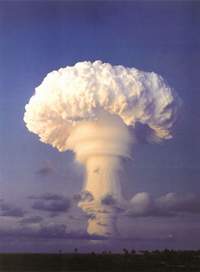Jordan and Algeria poised to develop nuclear programs
Two Arab countries have recently unveiled their plans for the development of nuclear energy programs. King Abdallah II of Jordan announced the intentions to develop a national nuclear program. Russian Minister of Industry and Power Industry Viktor Khristenko spoke about Algeria’s similar plans following his recent visit to that country. Specifically, Khristenko mentioned plans for bilateral cooperation aimed at developing the Algerian nuclear power industry. It is understood that we are talking about the declaration of certain plans that yet to be implemented. However, those plans are worth talking about.

On the face of it, the nuclear intentions of Jordan and Algeria look very much the same yet the development of nuclear programs may bring about different consequences in the two countries. Jordan is likely to coordinate its nuclear ambitions with the United States and Israel, without taking any precipitate steps. In other words, Jordan would make every effort in an attempt to provide maximum security and transparency of its nuclear program. Algeria would probably try to follow suit. However, the government of Algeria is not capable of ensuring permanent security for its potential nuclear projects.
There is a lot of difference between political processes Jordan and Algeria have gone through. Despite Jordan’s rather complicated political history, the royal family has a way of preserving stability of a small Mideastern nation. All the neighboring countries are greatly interested in maintaining Jordan’s stability, especially in the light of recent developments in Lebanon, which is no longer dubbed a “Mideastern Switzerland.” These days Lebanon looks very much like some “Rwanda on the Middle East.” In comparison with Jordan, the history of Algeria is a string of coups d’etat. It is not democracy; it is the power of guns that serves a principal guarantee of stability in Algeria. The authority of the military hardly matters in this case. The military in Algeria tried to play democracy and conduct a fair election but had to put the political process into reverse and stage yet another coup d’etat shortly after the ill-fated attempt, otherwise the Islamists would have seized power in Algeria. Some time ago the situation in Algeria reminded that in today’s Iraq, only without any U.S. troops on the ground. The country was being ripped apart by terrorist attacks, killings and adductions on a daily basis. The current government managed to achieve stability only after making a titanic effort.
The question is: Will the government be in control over the situation in the long term? Algerian President Abdelaziz Bouteflika is a strong leader yet he is fairly old and has certain health problems. Will the extremists be lying low? A leader of one of Algeria’s opposition groups has recently threatened to launch terrorist attacks against the U.S. and France for their support to “Boutiflika the Thief.” The leader also declared jihad on the Algerian government and boasted that he would soon receive instructions from Osama bin Laden. Compared with daily reports on terrorist attacks from Iraq, the threats voiced by the Algerian terrorist are not getting a lot of coverage in the media. It stands to reason that reports from Iraq look more instructive to the public since the coalition soldiers are being killed in that country.
It is understood that Russia’s leaders have good chances of finding common ground when dealing with the current Algerian leaders. Abdelaziz Bouteflika was a foreign minister and prominent figure of the National Liberation Front under Houari Boumedienne, Algerian military leader and president in the late 1960s and late 1970s. President Boumedienne had rather good relations with the Soviet Union at the time. All in all, would it be right to consider the implementation of Algeria’s nuclear program a well thought-out and far-sighted project from the strategic point of view? Let us assume that Russia would help build a nuclear power plant in Algeria. Can anybody predict the consequences should the radicals come to power in Algeria after staging yet another Islamic revolution or winning elections a couple of months after the plant has been commissioned? All the political repercussions aside, would Algeria have enough time for paying Russia in full for services rendered?
Politcom
Translated by Guerman Grachev
Pravda.ru
Subscribe to Pravda.Ru Telegram channel, Facebook, RSS!


